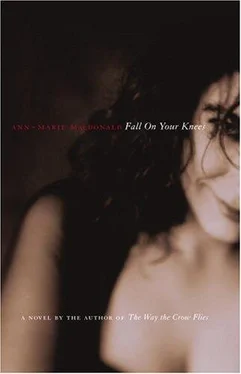This evening there were the customary protests — “Don’t pull! — my eyes are stinging! O-o-ow, stop i-i-it!” — but when Materia took Kathleen by the hair as usual and plunged her head backwards for the first rinsing, she kept it under long enough to say into the submerged green eyes, “Do you renounce Satan? Yes. And all his works? Yes. I baptize you in nomine Patris, et Filii et Spiritus Sancti , amen.” There. In an emergency, any Catholic can baptize a child. And after nine years, Materia considered it an emergency. Now the child would be safe. Now God could love her, even if Materia couldn’t, and the nuns wouldn’t think ill of her. Materia let go and Kathleen’s face broke the surface, gasping.
Kathleen didn’t cry or complain. She stood unwontedly docile as her mother towelled her dry, careful to attend roughly to the bad parts of the body.
In the wee hours of that night, Kathleen woke up screaming. She was still screaming when her daddy picked her up, and she clung to him as he walked her up and down the hallway, struggling to make out what she was saying.
“Who’s coming to get you?” he asked.
And when he had deciphered some more, “Who’s ‘Pete’?”
And she told him through her sobs.
He carried her downstairs, out the kitchen door, across the coal clinkers in the back yard, over the little foot-bridge to the garden and right up to the scarecrow.
“Now beat the can off him,” James ordered.
Kathleen was shaking uncontrollably, almost gagging with fear. The scarecrow’s hat cast a shadow over its featureless face. She couldn’t see if it was smiling or frowning.
“Make a fist, go on,” said James.
She did, still crying.
“Now whack the bejeesus out of him!”
She struck out and knocked the scarecrow’s head to the ground, hat and all.
“That’s the stuff!” said James, and he tossed her into the air and caught her with a war whoop.
Kathleen laughed as wildly as she’d been crying a moment before. It wound up in one of their yelling contests, only there were neighbours now and before long the lights came on in a nearby row of company houses and cries of protest, obscene and otherwise, were raised. James replied at the top of his lungs, “Shut up the lot of you and listen to this!”
And he had Kathleen sing:
“Quanto affetto! Quali cure!
che temete, padre mio?
Lassù in cielo presso Dio ,
veglia un angiol protettor .
Da noi toglie le sventure
di mia madre il priego santo;
non fia mai divelto o franto
questo a voi diletto fior.”
That’s how James got a reputation as a drinker, although at that point he was a teetotaller.
The next day he stuck the straw head back onto the stake and jammed the hat on the head. There were no more nightmares.
What great love! What care!
What do you fear, my father?
In heaven above, with God,
I have a guardian angel.
We are protected from all misfortune
by the holy prayers of my mother.
This flower that you love so much
will never be uprooted or destroyed.
Even though it was just an old cart, he painted it red with gold trim so she’d have something handsome to ride back and forth to school in. He did her initials in fancy gilt on the side and their joke was “Your carriage awaits without, ma’am.” It meant giving up some piano pupils, but he drove her the nine miles to Holy Angels every morning and he was there every afternoon when the big double doors opened and she came running down the steps to meet him. On Friday afternoons they’d linger in Sydney, wandering down to the yacht club wharf to look at the ships in the harbour.
“One day you’ll get on one of those liners, my darling, and go.”
She wanted him to come with her, of course, but he didn’t patronize her. “You’re going to sing for people all over the world. I won’t always be there, but I’ll always be your daddy.”
At which she would cry and he would take them for ice-cream at Crown Bakery, her eyelashes still wet but her eyes smiling once more. She never stayed sad for long. People stared wherever they went because she was beautiful, and the two of them were so obviously the best of friends.
James knew that someday he’d have to hand her over to professionals, send her far away, but for now…. There was a God. James consecrated his life to being a worthy caretaker of God’s gift. It was how he could endure teaching the offspring of the petty bourgeoisie to mangle “Für Elise.” I’ll do anything, he told God and himself. I’ll cut off my arm, I’ll sell the teeth in my head, I’ll enter the pit. I’ll allow my wife to get a job.
“Okay,” said Materia.
He prepared himself for the fact that she’d likely get work cleaning and cooking in someone else’s house, or at a hotel. He told her to use her maiden name. “If people think you’re married, they’ll pay you less,” he explained. It mustn’t be known that Kathleen Piper’s mother was a maid.
Imagine his surprise when Materia left the house a few evenings later wearing her good dress, her hair combed and done up under her hat.
“Where’re you going, missus?”
“Work.”
On Plummer Avenue, the main drag of the boom town, inside the Empire Theatre, the silver screen flickered, and down in the orchestra pit so did the piano. Trills and triplets seemed a natural counterpart to the frenetic dance of light and shadow above.
The audience leans slowly back as the locomotive appears on the horizon, tinkling towards them at first, birds singing — just another day in the country — then the first hint of doom as the train looms larger; a switch from major to minor, chugga chugga, here it comes rattling and rolling, whistle screeching, punctuated by the warning woo-woo , escalating through the landscape in a melody of mad elation, hurtling over the keys till all erupts in chaos, notes and birds fly asunder and the speeding iron horse thunders right over our heads and past us.
The audience is breathless, eager for the next terror, all you can take for a nickel. Materia can’t believe she’s getting paid for this.
The next scene is more terrifying. A man in evening clothes has cornered a young woman in a slinky nightgown halfway up a clock tower. No narrative preamble required, all ist klar , the shadows lurk, the tower lists, the music creeps the winding stair, the villain spies a grace-note of silken hem and he’s on the chase in six-eight time up to where our heroine clings to a snatch of girlish melody, teetering on the precipice of high E, overlooking the street eight octaves below. Villain struggles with virgin in a macabre waltz, Strauss turned Faust, until, just when it seems she’ll plummet, dash her brains on the bass clef and die entangled in the web of the lower stave, a vision in tenor crescendos on to save the day in resolving chords.
Before long, Materia was playing for local ceilidhs and travelling vaudeville troupes.
In December 1909, James boarded Kathleen at Holy Angels because children were dying in the boom town. Scarlet fever, diphtheria, cholera, typhoid, smallpox, tuberculosis. Leaving a wake of little white coffins. Outbreaks of disease were far from uncommon but this was something else, this was an epidemic brought on by the miners’ strike. Rows of company houses sat empty, their striking tenants evicted, yanked naked some of them, pulled off the crapper and out of the cradle, credit cut off at the Company Store. Pinkerton guards and special company constables went door to door till there was more furniture on the streets than in the houses. Even miners who had bought their own homes were evicted, the coal company having put the fear of God into the mortgage company. Families hunkered down in ragged tent cities out in the fields, no running water, less food, scant shelter from the Atlantic winter winds. Scarlet blotches bloomed on the thin cheeks of children, they suffocated on pus or died worn out from coughing.
Читать дальше












